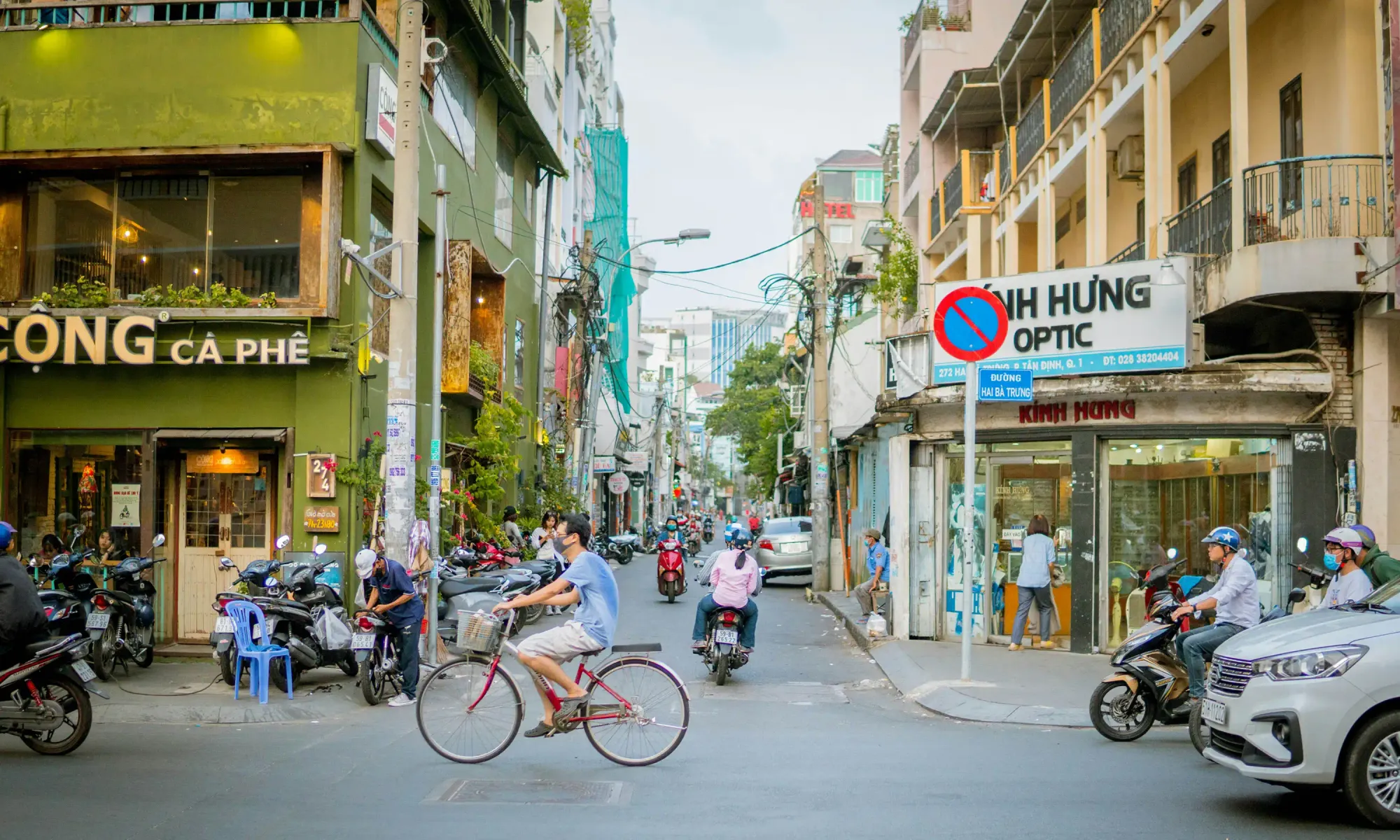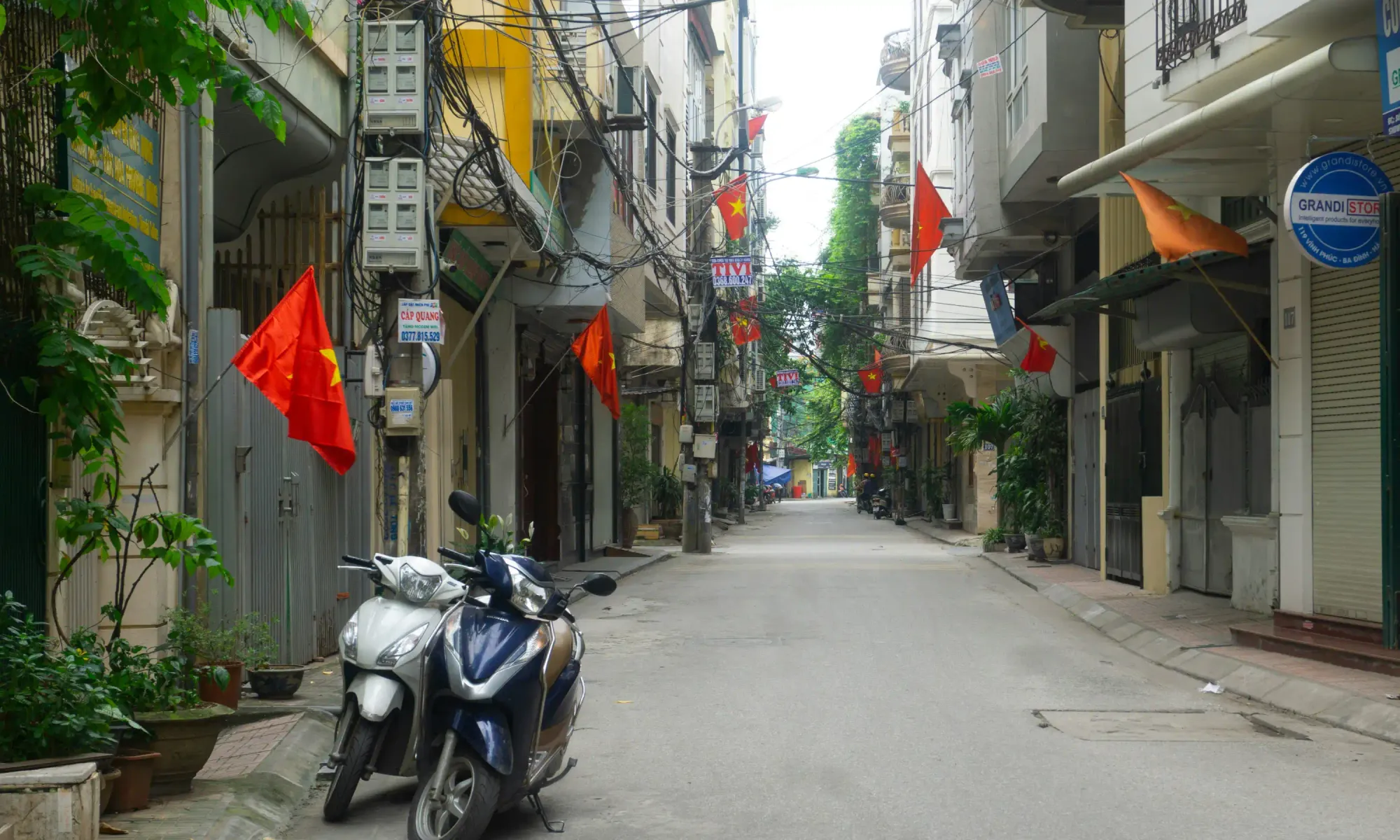Tokenization in Vietnam: Tradition Meets Digital Innovation
Vietnam advances real estate tokenization with new laws and pilot exchanges, opening regulated paths for fractional property investment.

Funnily enough, I used to think “Vietnam” meant only jungles. I couldn’t have been more wrong... Vietnam is a country that pretends to be simple, but step a bit closer and it reveals itself far richer than any stereotype. Here, a morning might begin with a cup of famous egg coffee – thick and velvety like a dessert – and end with a walk down colonial-era streets where French architecture stands next to bright Buddhist temples. It’s a place where the karst cliffs of Ha Long Bay rise from misty waters like props from an ancient legend, where jungles hide giant caves, and where the green rice terraces of the north cascade to the horizon.
Vietnam easily shows traces of its communist past – from Ho Chi Minh’s mausoleum to schoolchildren’s red scarves – but it also surprises with its rapidly expanding modern megacities. Each day here feels like a new journey: unpredictable, colorful, and a bit chaotic. And amid all this vibrancy, Vietnam is now quietly embracing a cutting-edge change in finance and real estate: the tokenization of assets.
Vietnam’s Digital Awakening in Finance
Vietnam’s youthful energy isn’t just in its streets and cafes – it’s also online. In fact, Vietnam ranks among the leading countries in blockchain adoption. The country has one of the world’s highest rates of crypto ownership: by 2024 about 17.4% of Vietnamese (around 17 million people) held some form of cryptocurrency. This tech-savvy enthusiasm is backed by government action. In June 2025, Vietnam became the first country in the world to formally recognize digital assets as property. The National Assembly passed the Digital Technology Industry Law (effective January 1, 2026) which legally defines virtual assets (like crypto tokens) under the Civil Code. In simple terms, Vietnam now views digital tokens as a type of asset, providing much-needed legal clarity.

But Vietnam’s approach is cautious and uniquely its own. Alongside the new law, regulators are preparing a pilot program for digital-asset exchanges that will run for five years (through 2030). This state-supervised pilot will allow trading of crypto-assets – including tokenized real-world assets – in a controlled environment. The government wants to encourage innovation while keeping a close eye on investor safety. The rules of the pilot are quite strict: for example, only licensed Vietnamese companies can issue asset-backed tokens, and initially only foreign investors are allowed to subscribe to new token offerings. Domestic investors can trade tokens they already owned before the pilot, but they can’t yet buy newly issued tokens freely. This shows Vietnam’s careful balance – opening the door to global capital and new technology, but making sure local citizens are protected as the market develops. It’s also notable that Vietnam still bans using cryptocurrency directly for payments, even under the new regime. Any subscription or investment in tokenized assets must be settled in Vietnamese đồng through the banking system (unless the token offering is entirely offshore). In short, Vietnam is embracing the digital future, but doing so on its own terms and pace.
Why Tokenize Real Estate in Vietnam?
Real estate is one of Vietnam’s most beloved investment sectors – but it’s traditionally been accessible only to the wealthy or well-connected. Property prices in major cities have soared beyond ordinary incomes. In 2025, apartment prices in Hanoi and Ho Chi Minh City climbed to around 80 million đồng (≈$3,000) per square meter, while average annual incomes linger just below 100 million đồng. That means a modest home can cost decades’ worth of a typical worker’s salary, putting direct investment far out of reach for most families. This huge affordability gap is a real issue for Vietnam’s growing middle class.

Tokenization offers a bold solution. What if instead of buying an entire apartment or office, an investor could buy a small fraction of it? Tokenization makes that possible by turning a property’s value into many digital shares. In simple terms, a building or fund is divided into many small parts and sold as digital tokens on a blockchain. Investors can purchase a fraction – a few tokens – instead of needing to pay for the whole asset. This fractional ownership model dramatically lowers the entry barrier by reducing the capital outlay needed to invest. For example, rather than needing $200,000 to buy an apartment, an average person might invest $100 or $1,000 to buy tokenized “slices” of a high-value property, sharing in its rental income and future sale profits. By allowing people to buy “small slices” of buildings, tokenization makes real estate investment more flexible and inclusive for Vietnamese citizens.
Another advantage is attracting outside investors. Vietnam has some limits on direct foreign ownership of real estate, but tokenization can open back doors for global capital. Digital tokens can be bought from anywhere in the world, subject to regulations. A property deal in Vietnam could more easily include investors from Europe, the U.S., or elsewhere, who participate simply by registering on a tokenization platform and buying tokens, rather than navigating complex local purchase laws. Essentially, issuing tokens lets overseas investors participate in Vietnamese real estate deals without flying in or handling local red tape. This broader investor pool means more funding sources for Vietnamese developers and more liquidity for the market. Real estate tokenization can also make transactions faster and more transparent – trades happen on a blockchain ledger that updates in real time, potentially avoiding months of paperwork. All these reasons make tokenization an attractive concept in Vietnam: it addresses the affordability problem, invites international investment, and uses technology to modernize a traditional industry.

New Laws and a Framework for Tokenization
For a long time, one of the biggest hurdles for tokenization in Vietnam was legal uncertainty. Before 2023, there were no clear rules on whether digital tokens were allowed, what rights they gave, or how they’d be regulated. The recent Digital Technology Industry Law changes that. Now, digital tokens are legally recognized as assets, and Vietnam is building a framework to handle them safely. A key principle in the new approach is “same activity, same risk, same rules.” If a token behaves like a security (for example, a token that gives you ownership or profit rights in a piece of property), Vietnam will treat it as a security. The State Securities Commission (SSC) has made it clear that such tokenized real estate offerings must comply with securities laws. In practice, that means property tokens have to follow the same strict rules as stocks or bonds. Companies issuing a token that represents shares in a building, for instance, need to register or qualify for exemptions, provide prospectuses or disclosures, and ensure only eligible investors buy in, just as they would with any investment product. The upside is greater investor protection and credibility – people can have more confidence that a tokenized asset isn’t a wild west scheme but something under regulatory supervision.
Vietnam’s regulators are also creating a pathway for how and where these tokens can be traded. Under the coming pilot exchange regime, licensed platforms will be set up for trading crypto-assets (including tokens for real assets). These platforms will likely be overseen by the Ministry of Finance and SSC, ensuring anti-money-laundering checks and market monitoring. The first licenses will go to firms with substantial capital and expertise, ensuring only serious, well-backed players operate exchanges. It’s a cautious approach, but it lays the groundwork for a healthy market in the long run. Officials have indicated that securities-token offerings are the most realistic path in the near term, until the pilot exchanges are fully live. In other words, initially tokenization will happen through private placements or limited offerings treated like security sales. Widespread public trading of these tokens might only come after the pilot proves successful.

It’s important to note that tokenization in Vietnam doesn’t bypass fundamental property laws. One common question is: does owning a token mean I own the land or apartment directly? The answer is no – land registry remains mandatory, and tokens only evidence economic rights, not official land title. Vietnam’s constitution and land law maintain that all land is ultimately under state ownership and must be recorded in the national land registry with a named owner. Token holders won’t have their names on that land certificate just by virtue of holding tokens.
Instead, typically the property is held by a legal entity (like a company or a fund), and the token represents a share in that entity or a contractual claim on the property’s income. This structure ensures that tokenization fits within existing real estate laws: the blockchain tokens mirror ownership benefits, but the formal ownership stays with an entity that the law recognizes. For investors, it means you can gain exposure to real estate returns, but the token itself is not a deed – it’s more like a digital share that gives you economic rights in the asset.
Vietnam’s careful rules extend to currency as well. The government has explicitly banned using cryptocurrencies as payment in the country, and this carries over to tokenized real estate sales. If you want to buy tokens for a Vietnamese property, you can’t pay in Bitcoin or Ether directly to a local issuer. All token purchase subscriptions must be settled in Vietnamese đồng via normal banking channels, unless the token offering is done offshore. This policy is meant to prevent money laundering and keep the financial system in the loop. It might feel old-fashioned to crypto enthusiasts, but it’s how Vietnam is melding the new digital assets with the traditional financial safeguards. Despite these rules, the direction is clearly set: Vietnam’s legal environment is turning friendlier for tokenization, providing a solid foundation that was absent just a few years ago.

From Pioneering Startups to Major Players
The idea of tokenizing real estate in Vietnam didn’t start with the government’s blessing – it began with bold entrepreneurs testing the waters. Back in 2021, a startup called MoonKa made headlines as the first project to use blockchain for real estate transactions in Vietnam. MoonKa essentially took a property and broke it into digital pieces (often in the form of NFTs), then offered these pieces so that everyone could buy a part. It was a groundbreaking concept: suddenly, a university student or a young professional could invest a small sum and become a partial owner of a house or land, something previously unimaginable. Following MoonKa’s early experiment, other platforms emerged. One notable example is Realbox, a platform created by Vietnamese founders that went international. Realbox allowed users to invest in real estate in Vietnam and abroad with extremely small amounts – in fact, people could start with as little as $1 to purchase a fraction of property value. Realbox and similar services showcased the appetite for digital real estate investment. Thousands of Vietnamese signed up, excited by the idea of entering the property market through their phones.
However, these early retail pilots, like MoonKa and Realbox, also highlighted legal risks. At the time, Vietnam had no specific laws for such models, so these startups operated in a gray area. Investors faced uncertainty – for instance, if something went wrong, would the contract be enforceable? Regulators watched warily as well; there were concerns about fraud or unwitting violation of securities laws. By around 2022, some of these projects slowed down or paused, awaiting clearer guidance. It became evident that while technology wasn’t a barrier, regulation was. The enthusiasm was there, but to scale up, investor protection and official sanction were necessary.

Fast forward to today, and the landscape is evolving. With the government now establishing a framework, we are seeing a shift from small startups to larger, established companies entering the tokenization arena. Major Vietnamese financial institutions have started to move. Notably, SSI Digital (an arm of SSI, one of Vietnam’s biggest brokerage and investment firms) and Techcombank Securities (TCBS, the securities subsidiary of a major bank) are preparing regulated pilot projects for tokenized real estate. These are big names in Vietnam’s finance industry, and their involvement signals that tokenization is being taken seriously. They are reportedly working under the state-endorsed schemes, likely coordinating with regulators to ensure compliance. This development marks a turning point: tokenization is no longer just a quirky startup idea but is entering the mainstream investment world. When a top brokerage starts exploring how to offer real estate tokens to clients, you know the concept is moving from the fringe to the center.
In addition to local financial firms, Vietnam’s tech sector is also joining forces to push tokenization forward. A very recent example (from November 2025) is the partnership between HVA Investment JSC and OnusChain. HVA is a Vietnamese investment company, and OnusChain is a blockchain platform (developed by the team behind a popular Vietnamese crypto app). They formed a strategic partnership to bring real-world asset tokenization to market, including real estate. This kind of collaboration is exciting because it combines traditional finance knowledge with blockchain technology expertise. Together, they plan to pilot tokenized projects in a way that meets the new regulations. It’s essentially a vote of confidence that Vietnam’s new rules will enable viable business models. We also see interest from international players eyeing Vietnam: for instance, global firms that have tokenized properties in other countries have mentioned Vietnam as a potential target once regulations allow. All these movements, from home-grown startups to big banks and cross-industry partnerships, suggest that Vietnam’s tokenization journey is gaining momentum. What was once experimental is becoming professionalized.

Challenges and the Road Ahead
Even with all the positive developments, tokenization in Vietnam is still in its early days, and not without challenges. The ink is barely dry on the new digital asset law, and many details still need to be worked out in practice. The government will have to issue detailed guidelines and decrees to implement the law – covering everything from how to license tokenization platforms, to tax treatment, to how disputes involving tokens would be resolved. Until those finer points are clarified, companies and investors may proceed cautiously. The pilot program’s strict limits (like restricting new token sales mostly to foreigners for now) could slow down local adoption in the short term. Many everyday Vietnamese investors might be hearing about tokenized real estate, but find they can’t easily participate until regulations loosen up after the pilot phase. There’s also the matter of infrastructure: Vietnam will need reputable, secure exchanges to trade these tokens. Setting up such an exchange requires significant capital (the government asks for at least 10,000 billion đồng in charter capital for a license) and technical know-how, so only a few big players might qualify initially. Ensuring there is enough liquidity – that is, enough buyers and sellers – will be another task, especially if local investors are limited at first.
Investor education and trust pose another challenge. Blockchain and tokenization are new concepts to a lot of people. While Vietnam has a high crypto adoption rate, not everyone understands the difference between speculative meme-coins and regulated asset-backed tokens. There have been scams and Ponzi schemes in the crypto space globally (and Vietnam has not been immune), so skepticism exists. To build public confidence, tokenization projects will need to be very transparent about how everything works. This is where the technology can actually help: because the blockchain can record every transaction, it can provide an immutable trail of what’s happening with an asset. In fact, those early projects demonstrated how transparency could be a selling point. As the CEO of Realbox noted, putting real estate data on smart contracts makes information transparent and easier for participants and even authorities to manage. Over time, if people see tokenization platforms operating reliably – paying out rental incomes on time, showing clear records of ownership, and following the law – trust will grow.

On the opportunity side, the road ahead is promising. Vietnam’s real estate market has long been attractive due to the country’s rapid economic growth and urbanization. Tokenization could amplify this by injecting fresh capital. A developer in Ho Chi Minh City might raise funds from a global pool of investors by issuing tokens for a new condo tower, rather than relying only on local banks or a few big investors. Small investors in Vietnam could gain access to asset types they previously couldn’t touch – imagine being able to invest in a fraction of a luxury resort or a commercial tower in downtown Saigon, even with a modest budget. This could help democratize wealth creation and spread financial benefits more widely. There’s also a potential competitive edge for Vietnam here. Other markets in Asia are also moving on this front – for instance, Hong Kong is actively embracing real estate tokenization as it turns properties into tradable digital shares, and Indonesia is exploring tokenized property investments from Jakarta to Bali. By getting a legal framework in place now, Vietnam positions itself as a forward-thinking hub for real estate innovation. It could attract foreign companies to pilot projects in Vietnam, bringing in not just investment but also knowledge transfer and technological collaboration.
Finally, as Vietnam integrates tokenization into its financial system, we might see long-term positive effects such as increased transparency in the notoriously opaque real estate sector. Every land sale or project funding on a blockchain could leave an auditable trail, reducing the chance for corruption or false record-keeping. The government is also likely thinking about new revenue streams – regulated token markets can be taxed, and vibrant investment activity contributes to economic growth. Legalizing digital assets is expected to unlock investment opportunities and generate new channels for capital, which Vietnam hopes to harness for development. In essence, tokenization fits well with Vietnam’s image: a dynamic, youthful economy that’s leapfrogging into modern technology while trying to keep stability. There will be bumps along the way, but if done right, Vietnam could become one of the success stories in the global shift toward real-world asset tokenization.
A New Frontier – With a Guide by Your Side
Vietnam’s venture into tokenizing real estate is a fascinating blend of tradition and innovation. It’s a country where ancient temples share the skyline with blockchain startups. The journey has only begun, but already the pieces are falling into place – clearer laws, pilot programs, interest from big companies, and a public eager to invest in new ways. In the near future, we might see someone in Hanoi owning a token that represents a slice of a beach resort in Đà Nẵng, or an overseas Vietnamese expatriate using tokens to invest in their hometown’s property market. The doors to these possibilities are opening gradually, and those who step through will be part of a pioneering wave.

Of course, navigating this new frontier can be complex. Tokenization involves legal, technical, and financial challenges that can be daunting for newcomers. This is where having the right partner matters. Companies like Tokenizer.Estate are here to make the process smoother – the platform provides a one-stop solution and even connects tokenization projects with licensed local partners in Vietnam. In other words, if you have a real estate asset you want to tokenize (or you’re an investor interested in tokenized properties), you don’t have to go it alone. Tokenizer.Estate and similar platforms guide you through compliance, technology setup, and investor outreach, ensuring that the tokenization is done securely and in line with Vietnamese regulations.
Vietnam has taught many visitors to expect the unexpected. The nation that once conjured images of jungles is now making a name as a potential blockchain trailblazer. Real estate tokenization in Vietnam is still a developing story – but it’s one that encapsulates the spirit of this country: youthful ambition, respect for its roots, and an eye on the future. As we watch Vietnam turn its property market into digital shares on a blockchain, one thing is clear: the landscape of investment will never be quite the same. And for those ready to be part of this new chapter, Vietnam’s mix of charm and innovation might just offer the perfect adventure in both travel and finance.

